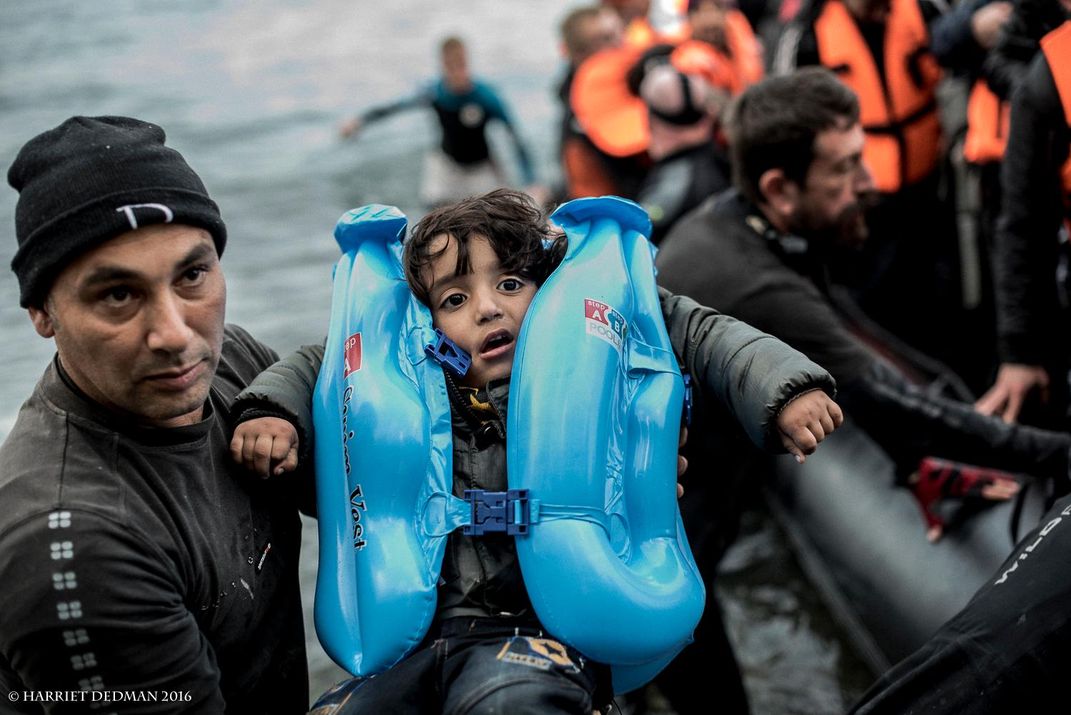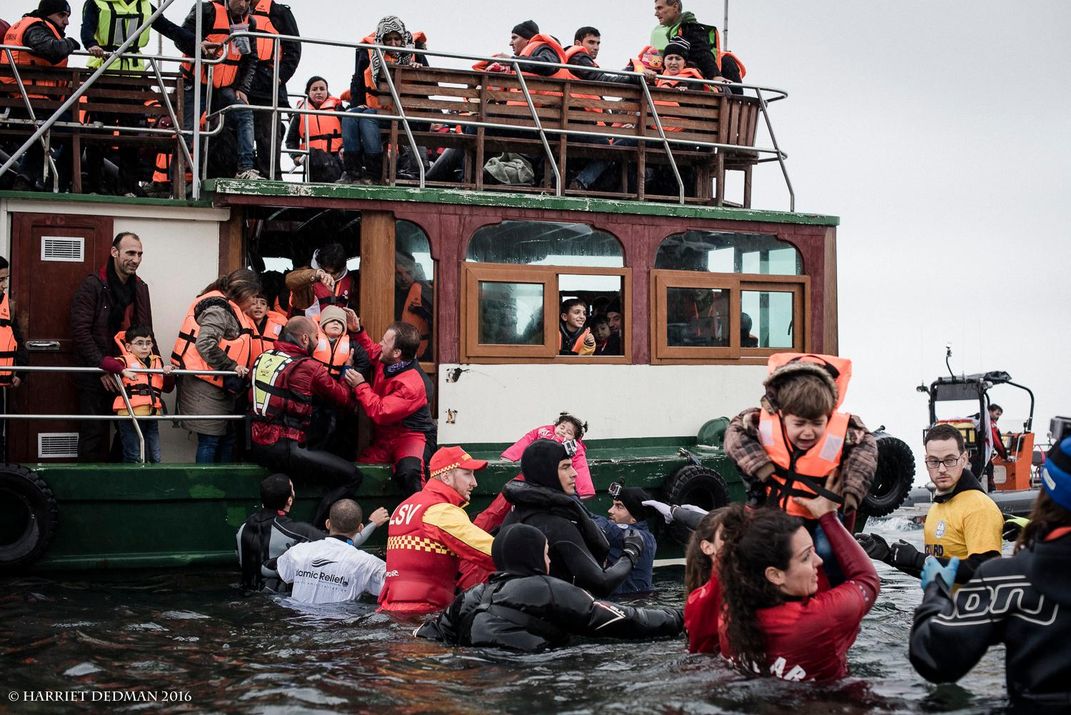Child Refugees Pose Unique Challenge for Mental Health Practitioners
As the crisis deepens, mental health experts move from questions of short-term survival to ones of longer-term rehabilitation
/https://tf-cmsv2-smithsonianmag-media.s3.amazonaws.com/filer/36/d3/36d3ee4d-35a9-4ba7-9107-4cad17de13b8/harrietdedman-3.jpg)
Last year, more than 1 million refugees—predominantly from Syria, Afghanistan and Iraq—made the journey to Europe by sea. A third of those were children.
For mental health professionals, these young refugees bring unique challenges. Fleeing conflict and war undoubtedly takes a deep psychological toll, but in the midst of an ongoing crisis, no one has yet assessed the full extent of what that toll is. And without a better understanding, physicians are struggling to treat this vulnerable population.
“Most of these children have grown up in war,” says Shelly Chvotzkin, 39, an American doctor with SCM Medical Missions in Lesvos, Greece. Chvotzkin describes young refugees in her care who draw pictures of beheadings, explosions and body parts. “You can’t compare the things that these children have gone through with any understood metrics of PTSD," she says.
Now, the first data on these young populations and the experiences of mental health physicians on the ground suggest the challenges—and hopes—that lie ahead.
A team of clinical psychologists from the Netherlands led by Rolf Kleber and Marieke Sleijpen has sought to cultivate a better understanding of the ways in which adolescent refugees deal with adversity, in order to develop better therapeutic intervention programs. “From our research it is clear that immigration procedures should be different for children and adults,” says Sleijpen.
Last year, Sleijpen and her team analyzed case studies of 200 refugees and asylum seekers between (on average) 10 and 20 years of age to find that young refugees are surprisingly resilient at dealing with extreme hardship and stress. But they also found that young refugees' obstacles do not end when their journey is over: it is often after their initial flight that they are at serious risk of developing a range of health issues, including PTSD, depression and emotional and behavioral problems.
While this young population may appear well-adjusted, Sleijpen says that we need rehabilitation initiatives to “look beyond the veil,” and for resettlement programs to rapidly implement ways and means to reduce pressure on their young charges.

Also key is understanding these refugees’ specific situations, says Shafik Amer, a Syrian psychologist working with refugees arriving in Jordan and now in Germany. He describes a group of Syrian children referred to him after they had been repeatedly raped—both during their exodus out of Syria, and within the refugee camps along its border. “This is trauma on an extreme scale,” he says. “Their arrival in a safe country marks the end of one journey, but—ultimately—the beginning of a tougher one.”
Now that the borders across Europe are closed, aid agencies in Europe are seeking to stabilize mental health initiatives for the more than 53,000 refugees stranded in Greece. In April 2016, the European Union pledged around $92 million to the United Nations High Commissioner for Refugees, the Red Cross and six international NGOs, to support their efforts in transitory refugee camps throughout Greece. Some of these organizations provide psychosocial services, however, it isn't clear how much of that funding has been allocated to them.
Roza Moisidou, a field psychologist with Doctors Without Borders in northern Greece, calls for more clinical support in the field as the refugee situation in that country stabilizes. “These people are going to stay in Greece,” says Moisidou. “This will be their final destination, so (symptoms) will come to the surface and they will need mental health support.”
In May, Moisidou and her team were able to facilitate just 250 consultations—an unsurprisingly low number, given how understaffed her team is. There are just 20 field psychologists with the organization in the entire country, compared to roughly 53,000 refugees. (Worldwide, more than 200 mental health practitioners are employed by the organization.)
Another problem is that many of those needing treatment have failed to come forward, says Boris Cheshirkov, a spokesperson for the UNHCR in Greece. After all, for a population that has been in motion and struggling just to survive, mental health is often not at the top of their list. “Even if you have suffered abuse, even if you are suffering from PTSD, even if you’re traumatized, that momentum to keep moving [was] still there,” Cheshirkov says.

Once resettled in the West, refugees are facing a disparate existence. In Germany, camps are multiple and dispersed; Stuttgart alone hosts over 125 different refugee camps and centers throughout the city. Young refugees are often placed into mainstream German schools, with limited opportunities for trauma-focused support.
Sleijpen challenges the existing division of care, where children facing multiple health issues are packed off to multiple service providers. “Consolidated care is key,” says Sleijpen, stating that a re-framing of the crisis and its requirements are needed. “Even the most hardened soldier will collapse. These are children, they are vulnerable. They are no longer agents of war.”
Outside of Europe, though, some innovative care programs are flourishing. Za’atari Refugee Camp in Jordan is now home to over 79,000 Syrian refugees. Through central coordination, many aid agencies work out of the site, and have established psychosocial programs to work with their young charges in the camp. From a taekwondo academy designed to instill discipline and order to religious programs for young women, these programs aim to create communities of solace and support.
Established by the UNHCR in 2012, the camp is just 12 miles from the Syrian border. Once thought to be temporary, it grows more permanent by the day—changing questions of short-term survival to ones of longer-term rehabilitation. “It has been four year since the camp started, so many of these kids that have been coming to this center are bored,” says Miraj Pradhan, a Jordan-based spokesperson for UNICEF. “We need to keep them engaged.”
A further 6,277 refugees crossed the Mediterranean, last week.